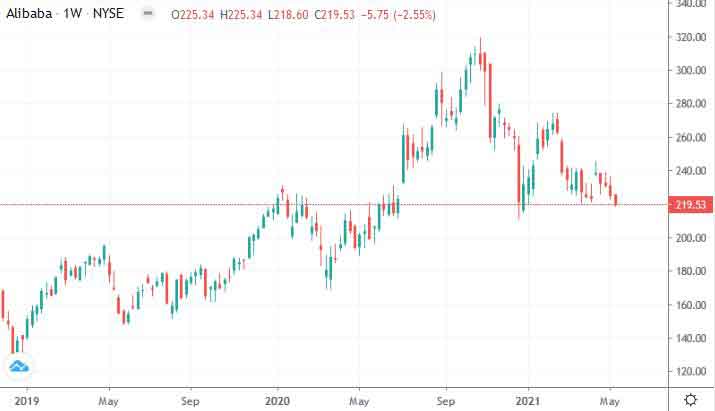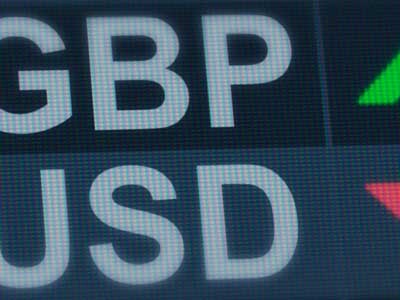Alibaba enjoys a good reputation among investors. Many believe that buying shares in a company is a reliable and long-term investment in China's fast-growing technology sector. The corporation owns the country's largest e-commerce platform and cloud infrastructure in China. Works in advertising, media, software, and games. At the same time, the issuer constantly doubles its revenue and shows an increase in profit.
For all its advantages, the issuer has faced a number of internal and external difficulties over the past six months and has lost almost a fifth of its market value. Today we will look at the reasons for these losses and find out whether the security of this company has a future.
Alibaba Group Holding Limited is a leader in the online sales market. The company has been around for more than 20 years, and during that time it has created its own ecosystem that is used as a platform for third parties. At the same time, the issuer does not sell directly, does not compete with sellers using its platform, and does not have a warehouse.
Alibaba has another e-commerce platform, Taobao Marketplace, and Tmall, a platform for brand owners and retailers. We all know about websites Alibaba.com and AliExpress.
The Trading Corporation has provided its clients with the infrastructure they need to do business, which allows traders to trade with their clients and business partners over the Internet.
Alibaba also has a cloud services business, grocery hypermarkets, a film company and a logistics network, as well as stakes in Ant Group, a financial technology company.
What Alibaba went through
So, what problems has this market had to face in the last six months? – There were two of them. One came from the United States, the other from the Chinese authorities. But, let's start in order.
As you know, former US President Donald Trump announced a "crusade" against China. The White House attacked not only the Chinese economy, but also private capital. And as you can imagine, Alibaba was one of the first on this list.
President Trump has resigned, but his case is still alive. In March 2021, it was announced that Alibaba shares could be removed from the US list. In March, the SEC began implementing a law passed by Trump that requires foreign companies trading on the stock market to conduct audits of US regulators.
The conflict is still raging, but is it worth worrying about the original idea of Jack Ma? – We don't think so. Yes, the White House will put pressure on Beijing and major Chinese companies, but it is unlikely to end in something bad.
First, Wall Street is unlikely to want to lose Chinese companies that want to trade on US platforms.
In addition, many asset management companies, such as Blackrock, Vanguard, and T. Rowe Price, are Alibaba's largest shareholders. And they are unlikely to be thrilled with the chaos that could result from the company's $ 600 billion ban. Most likely, they have already started actively lobbying for this issue and will do everything to prevent Alibaba from being blacklisted.
The second problem faced by the Chinese business platform was the Chinese government. Everyone knows that human rights and freedom of speech are violated in China. Unfortunately, Jack Ma had to see for himself. Admittedly, he himself angered Beijing by criticizing the Chinese regulator. Without thinking twice, regulators in China fought back. First, they canceled the IPO of Ant Group, an Alibaba subsidiary. They then began checking Alibaba's activities for monopolization, and then imposed a multibillion-dollar fine. Does Beijing want to destroy Jack Ma? Again, we don't think so. It is unlikely that Beijing will want to appear before the world community as a "killer" of such business. This is not profitable either from a political or economic point of view. Beijing wants to show that such giants should know their place. In China, neither a company nor an ordinary person can be above the Communist Party. In our opinion, they succeeded. They could have arrested Jack Ma long ago and taken control of all of Alibaba's assets, but both Ma and the company are still with us. So we won't be surprised if the IPO of Alibaba's Ant subsidiary returns to the agenda before the end of 2021.

What's with Alibaba's business now?
"What doesn't kill us makes us stronger" – this statement can be attributed to the Chinese company. She passed all the tests and not only did not suffer, but was able to continue to thrive. So, in the last quarter, the issuer reported an increase in revenue by 30%, and net profit amounted to $28.8 billion.
This corporation can be compared to the American Amazon. First, they work in the field of e-commerce and cloud services. In recent years, Amazon's revenue has grown by about 206%, and its shares have risen by 424%. The same figures for Alibaba rose by about 200% and 425%, respectively. On the other hand, Alibaba Group shares are about 200% cheaper than Amazon.
There is always a lot of negativity around companies like Alibaba. At the same time, you need to make sure how the core business feels in this case. Alibaba remains the e-commerce leader in the largest emerging economies and in the largest technology markets of the 21st century. If you buy the issuer's shares today, you will be satisfied in five years. In fact, for long-term investors, any downturn is an advantage, especially when the company's business is booming.
Alibaba is currently trading at about $225. The asset is still under pressure, but it seems that buyers have managed to stop sellers. Now they need new drivers to get the stock back on track. This catalyst may well be the next report.
However, there is no need to hurry. The correction may be delayed, so we advise you to wait for the close above the level of $235-240 and buy the asset in the direction of $280.


 After yesterday's report on consumer inflation in the United States, which showed an increase from 7.9% to 8.5% over the month, the probability of a Fed rate hike in May by 50 basis points in the futures market increased to 90%, and analysts assume that there will be 3 such aggressive increases in 2022.Nevertheless, despite the record rate of inflation, many experts believe that it has begun to slow down, as the monthly growth rate was 0.3% with a forecast of 0.5%. Maybe the Fed will soon have to abandon aggressive tightening of monetary policy.Inflation in the G7 countriesLael Brainard has already announced the first signs of a slowdown in consumer price dynamics, noting that the Federal Reserve will continue raising rates in any case, but it may start reducing the balance sheet not in May, but in June. Her words became a lifeline for the EUR/USD bulls. Assumptions about the later start of the balance sheet reduction reduced the yield of treasuries and supported euro buyers.It is possible that Christine Lagarde's team will also support the euro. There are more and more hawkish voices in the ECB Council calling for a tightening of monetary policy. The heads of the Central Banks of Slovenia, Austria and Belgium believe that two increases in the deposit rate should take place in 2022. This attitude will help EUR/USD to find the bottom and return above 1.09. Nevertheless, trading from forex levels shows that when the day closes below 1.083, the downtrend continues.Indeed, the European currency has a lot of problems, and even a slight decrease in interest in the dollar does not indicate a change in the direction of movement of EUR/USD.
After yesterday's report on consumer inflation in the United States, which showed an increase from 7.9% to 8.5% over the month, the probability of a Fed rate hike in May by 50 basis points in the futures market increased to 90%, and analysts assume that there will be 3 such aggressive increases in 2022.Nevertheless, despite the record rate of inflation, many experts believe that it has begun to slow down, as the monthly growth rate was 0.3% with a forecast of 0.5%. Maybe the Fed will soon have to abandon aggressive tightening of monetary policy.Inflation in the G7 countriesLael Brainard has already announced the first signs of a slowdown in consumer price dynamics, noting that the Federal Reserve will continue raising rates in any case, but it may start reducing the balance sheet not in May, but in June. Her words became a lifeline for the EUR/USD bulls. Assumptions about the later start of the balance sheet reduction reduced the yield of treasuries and supported euro buyers.It is possible that Christine Lagarde's team will also support the euro. There are more and more hawkish voices in the ECB Council calling for a tightening of monetary policy. The heads of the Central Banks of Slovenia, Austria and Belgium believe that two increases in the deposit rate should take place in 2022. This attitude will help EUR/USD to find the bottom and return above 1.09. Nevertheless, trading from forex levels shows that when the day closes below 1.083, the downtrend continues.Indeed, the European currency has a lot of problems, and even a slight decrease in interest in the dollar does not indicate a change in the direction of movement of EUR/USD.  Data from the Comex exchange indicate a decrease in the cost of copper. By 5 a.m.GMT, the price of a pound of metal dropped to $4,7105, or 0.75% compared to its value at the close of trading the day before. Yesterday, trading on the London Stock Exchange ended with a rise in the price of industrial metals. The cost of copper rose to $10,367.50 cents, or 0.5%. Aluminum rose to $3,551, or 3.4%. The price of zinc rose to $4,149, or 3%. One of the factors that has a significant impact on the markets is the US currency exchange rate. Its growth makes it unprofitable to purchase raw materials for investors with other currencies, including metals. Today, the dollar index is showing growth. It has already risen by 0.13% to 97.91 points. Statistics from China also contribute to the fall in the price of copper. Economic activity in this country is declining due to the deterioration of the epidemiological situation. In this regard, a reduction in demand for copper is expected.
Data from the Comex exchange indicate a decrease in the cost of copper. By 5 a.m.GMT, the price of a pound of metal dropped to $4,7105, or 0.75% compared to its value at the close of trading the day before. Yesterday, trading on the London Stock Exchange ended with a rise in the price of industrial metals. The cost of copper rose to $10,367.50 cents, or 0.5%. Aluminum rose to $3,551, or 3.4%. The price of zinc rose to $4,149, or 3%. One of the factors that has a significant impact on the markets is the US currency exchange rate. Its growth makes it unprofitable to purchase raw materials for investors with other currencies, including metals. Today, the dollar index is showing growth. It has already risen by 0.13% to 97.91 points. Statistics from China also contribute to the fall in the price of copper. Economic activity in this country is declining due to the deterioration of the epidemiological situation. In this regard, a reduction in demand for copper is expected.  In order to limit the supply of Russian gas, the European Commission intends to gradually increase the volume of liquefied natural gas purchased in the United States. According to the plans discussed in 2021 on the import of American LNG, it was assumed that this year its volumes would be at the level of 22 billion cubic meters. Now the EU has agreed with the United States to increase this figure by 15 billion cubic meters. In total, the gas purchased in the United States in 2022 will replace 10% of Russian annual gas supplies. Thus, the abandonment of Russian gas will be carried out gradually. The European Commission plans that in 2023 additional gas supplies will grow to 35 billion cubic meters, which will be possible thanks to the diversification of gas supplies, which are currently being negotiated with international partners. The EU's efforts to enhance energy efficiency and develop renewable energy sources will also contribute to reducing dependence on supplies from the Russian Federation.
In order to limit the supply of Russian gas, the European Commission intends to gradually increase the volume of liquefied natural gas purchased in the United States. According to the plans discussed in 2021 on the import of American LNG, it was assumed that this year its volumes would be at the level of 22 billion cubic meters. Now the EU has agreed with the United States to increase this figure by 15 billion cubic meters. In total, the gas purchased in the United States in 2022 will replace 10% of Russian annual gas supplies. Thus, the abandonment of Russian gas will be carried out gradually. The European Commission plans that in 2023 additional gas supplies will grow to 35 billion cubic meters, which will be possible thanks to the diversification of gas supplies, which are currently being negotiated with international partners. The EU's efforts to enhance energy efficiency and develop renewable energy sources will also contribute to reducing dependence on supplies from the Russian Federation.  Cryptocurrency Forecast for today. Consolidation and uncertainty of trading in the range of 48051 – 46810 dollars are visible. It is possible that market participants are waiting for US labor market data.The capitalization of the cryptocurrency market by the end of Wednesday amounted to 2.15 trillion US dollars against 1.90 on Tuesday. A negative news background can increase short positions on digital assets.The Norwegian company Opera has added support for Bitcoin, Solana, Polygon and other cryptocurrencies to the browser.Integration of multiple blockchains and second-level development solutions was called a key strategy and part of Opera's mission, which is to introduce millions of users to Web 3.0.Solana and Bitcoin are currently available only in Opera for Android. Their support in the "Crypto Browser Project" will appear in the coming months.The dollar and the cryptocurrency market will be sensitive to the release of the number of initial applications for unemployment benefits, the price index of personal consumption expenditures. The focus will also be on the business activity index (PMI) in Chicago, the unemployment rate and the index of business activity in the manufacturing sector (PMI) from ISM.
Cryptocurrency Forecast for today. Consolidation and uncertainty of trading in the range of 48051 – 46810 dollars are visible. It is possible that market participants are waiting for US labor market data.The capitalization of the cryptocurrency market by the end of Wednesday amounted to 2.15 trillion US dollars against 1.90 on Tuesday. A negative news background can increase short positions on digital assets.The Norwegian company Opera has added support for Bitcoin, Solana, Polygon and other cryptocurrencies to the browser.Integration of multiple blockchains and second-level development solutions was called a key strategy and part of Opera's mission, which is to introduce millions of users to Web 3.0.Solana and Bitcoin are currently available only in Opera for Android. Their support in the "Crypto Browser Project" will appear in the coming months.The dollar and the cryptocurrency market will be sensitive to the release of the number of initial applications for unemployment benefits, the price index of personal consumption expenditures. The focus will also be on the business activity index (PMI) in Chicago, the unemployment rate and the index of business activity in the manufacturing sector (PMI) from ISM.  Gold exchange rate forecast for today. The banking metal is still very sensitive to the dollar. The next signal for the market is the US unemployment rate for March. If the current value comes out better than the forecast, then there will be an additional reason for the Fed to reduce the purchase of securities.The US stock market ended Wednesday trading lower on the back of negative dynamics from the consumer services, technology and finance sectors. At the close on the New York Stock Exchange, the Dow Jones fell by 0.19%, the S&P 500 index fell by 0.63%.At the same time, there is an increase in inflation. Consumer prices in Germany, harmonized with EU standards, increased by 7.6% in annual terms in March, according to preliminary data from the country's Federal Statistical Office (Destatis).Analysts surveyed by Bloomberg, on average, predicted a rise of 6.8%. Trading Economics experts expected growth of 6.7%. In February, inflation in the country was 5.5%.As for Japan, retail sales in February decreased by 0.8% compared to the same month last year, according to data from the country's Ministry of Economy, Trade and Industry. The drop was recorded for the first time since September last year. Analysts on average expected a decline of only 0.3%.
Gold exchange rate forecast for today. The banking metal is still very sensitive to the dollar. The next signal for the market is the US unemployment rate for March. If the current value comes out better than the forecast, then there will be an additional reason for the Fed to reduce the purchase of securities.The US stock market ended Wednesday trading lower on the back of negative dynamics from the consumer services, technology and finance sectors. At the close on the New York Stock Exchange, the Dow Jones fell by 0.19%, the S&P 500 index fell by 0.63%.At the same time, there is an increase in inflation. Consumer prices in Germany, harmonized with EU standards, increased by 7.6% in annual terms in March, according to preliminary data from the country's Federal Statistical Office (Destatis).Analysts surveyed by Bloomberg, on average, predicted a rise of 6.8%. Trading Economics experts expected growth of 6.7%. In February, inflation in the country was 5.5%.As for Japan, retail sales in February decreased by 0.8% compared to the same month last year, according to data from the country's Ministry of Economy, Trade and Industry. The drop was recorded for the first time since September last year. Analysts on average expected a decline of only 0.3%.  Forex. Pound/Dollar (GBP/USD) forecast for today. The pair gained a foothold in the area above the European support of 1.3127. At the moment, there is a strong resistance at the level of 1.3202.The yield of 10-year UK bonds is near the March maximum values at 1.668%.This time, the US dollar was under pressure against other world currencies. The US economy in the fourth quarter of 2021 increased by 6.9% in terms of annual rates, according to the final data of the US Department of Commerce. Earlier, a 7% rise was announced.Experts on average expected an upward revision of the indicator to 7.1%, according to Trading Economics.According to the revised data of the Ministry of Trade, consumer spending, which accounts for two-thirds of US GDP, increased by 2.5% in the fourth quarter, not 3.1%, as previously reported.Exports soared by 22.4%, imports increased by 17.9% - instead of the previously announced 17.6%.On Tuesday, market participants are likely to wait for the reaction of the pound after the publication of UK GDP, housing price index, business investments, investments of commercial enterprises. The US labor market data will also affect the course of trading.
Forex. Pound/Dollar (GBP/USD) forecast for today. The pair gained a foothold in the area above the European support of 1.3127. At the moment, there is a strong resistance at the level of 1.3202.The yield of 10-year UK bonds is near the March maximum values at 1.668%.This time, the US dollar was under pressure against other world currencies. The US economy in the fourth quarter of 2021 increased by 6.9% in terms of annual rates, according to the final data of the US Department of Commerce. Earlier, a 7% rise was announced.Experts on average expected an upward revision of the indicator to 7.1%, according to Trading Economics.According to the revised data of the Ministry of Trade, consumer spending, which accounts for two-thirds of US GDP, increased by 2.5% in the fourth quarter, not 3.1%, as previously reported.Exports soared by 22.4%, imports increased by 17.9% - instead of the previously announced 17.6%.On Tuesday, market participants are likely to wait for the reaction of the pound after the publication of UK GDP, housing price index, business investments, investments of commercial enterprises. The US labor market data will also affect the course of trading.  Forex. Euro/Dollar (EUR/USD) forecast for today. Positive trading dynamics was observed throughout the trading environment.The yield on 10-year US bonds has declined from the March highs and is now at 2.351%.The bidding process is still influenced by the hope that the war in Europe will end soon. The recent negotiations between the Ukrainian and Russian sides have created optimism in the financial markets.Meanwhile, the composite index of business and consumer confidence in the eurozone in March fell to 108.5 points against 113.9 points a month earlier, according to data from the European Commission. The indicator value turned out to be the lowest since March last year.Experts on average predicted a more moderate decline, up to 109 points, according to Trading Economics.The decline in the composite index is mainly caused by a decline in European consumer confidence due to rising inflation and events in Ukraine. The indicator of consumer confidence in the eurozone in March collapsed to minus 18.7 points against minus 8.8 points last month, coinciding with the consensus forecast.Today, the focus will be on the data of the Eurozone and the US labor market — the change in the number of unemployed in Germany, the unemployment rate of the Eurozone and the number of initial applications for unemployment benefits in the US.
Forex. Euro/Dollar (EUR/USD) forecast for today. Positive trading dynamics was observed throughout the trading environment.The yield on 10-year US bonds has declined from the March highs and is now at 2.351%.The bidding process is still influenced by the hope that the war in Europe will end soon. The recent negotiations between the Ukrainian and Russian sides have created optimism in the financial markets.Meanwhile, the composite index of business and consumer confidence in the eurozone in March fell to 108.5 points against 113.9 points a month earlier, according to data from the European Commission. The indicator value turned out to be the lowest since March last year.Experts on average predicted a more moderate decline, up to 109 points, according to Trading Economics.The decline in the composite index is mainly caused by a decline in European consumer confidence due to rising inflation and events in Ukraine. The indicator of consumer confidence in the eurozone in March collapsed to minus 18.7 points against minus 8.8 points last month, coinciding with the consensus forecast.Today, the focus will be on the data of the Eurozone and the US labor market — the change in the number of unemployed in Germany, the unemployment rate of the Eurozone and the number of initial applications for unemployment benefits in the US.  Cryptocurrency Forecast for today. Now the digital asset is trading in the range of 48051 – 46820 dollars. After sharp movements in the market, market participants adhere to a wait–and-see position - soon US GDP and labor market data. Financial markets, including digital assets, can react strongly to these events.The capitalization of the cryptocurrency market by the end of Tuesday amounted to 2.11 trillion US dollars against 2.13 on Monday.According to media reports, MacroStrategy, a subsidiary of MicroStrategy, took out a loan for $205 million secured in bitcoins. The loan was issued by Silvergate Bank. According to the terms of the agreement, the loan funds will be used to purchase cryptocurrencies.At the same time, the US Treasury Department proposed to extend to cryptocurrencies the requirements for informing the IRS Tax Service about foreign accounts of citizens with assets over $50 thousand. The relevant document is published on the official website of the department. If adopted, the new requirements will come into force in 2023.Representatives of the Hong Kong Stock Exchange announced the launch of a platform for trading tokenized assets called Diamond. The trading service will use smart contracts, blockchain and cloud computing technologies, thanks to which it will be able to work around the clock.
Cryptocurrency Forecast for today. Now the digital asset is trading in the range of 48051 – 46820 dollars. After sharp movements in the market, market participants adhere to a wait–and-see position - soon US GDP and labor market data. Financial markets, including digital assets, can react strongly to these events.The capitalization of the cryptocurrency market by the end of Tuesday amounted to 2.11 trillion US dollars against 2.13 on Monday.According to media reports, MacroStrategy, a subsidiary of MicroStrategy, took out a loan for $205 million secured in bitcoins. The loan was issued by Silvergate Bank. According to the terms of the agreement, the loan funds will be used to purchase cryptocurrencies.At the same time, the US Treasury Department proposed to extend to cryptocurrencies the requirements for informing the IRS Tax Service about foreign accounts of citizens with assets over $50 thousand. The relevant document is published on the official website of the department. If adopted, the new requirements will come into force in 2023.Representatives of the Hong Kong Stock Exchange announced the launch of a platform for trading tokenized assets called Diamond. The trading service will use smart contracts, blockchain and cloud computing technologies, thanks to which it will be able to work around the clock.